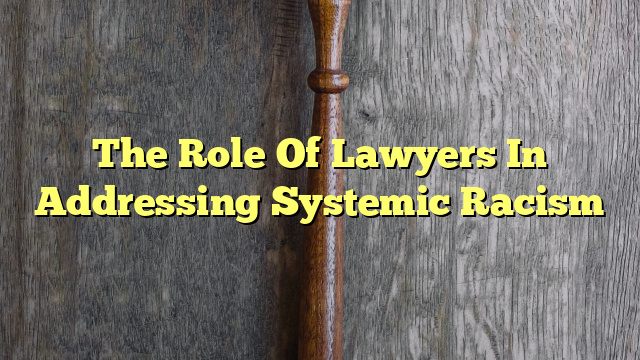Table of Contents
Overview
Systemic racism is the oppression of marginalized communities through unjust laws, practices, and policies that have been ingrained in our society over time. It is expressed in different forms, including racial injustice, police brutality, and mass incarceration.
Lawyers have a powerful role to play in addressing systemic racism. They can challenge existing laws, advocate for policy change, and provide legal representation to those affected by racism. This article will explore the role of lawyers in addressing systemic racism in the courtroom, through legislation, and through activism.
The Courtroom
In the courtroom, lawyers can challenge existing laws that perpetuate racism. This includes challenging laws that disproportionately affect people of color, such as voter suppression laws or immigration laws. Lawyers can also represent clients who have been targeted by police because of their race or ethnicity, and challenge police brutality in court.
In addition, lawyers can challenge implicit biases in the courtroom. Implicit biases are stereotypes and prejudices that are subconsciously held by individuals, and they can lead to unfair treatment of people of color in the courtroom. Lawyers can work to challenge these biases and ensure that everyone receives equal treatment under the law.
Legislation
Lawyers can also work to promote policy changes that address systemic racism. This can include advocating for laws that address racial injustice and police brutality. For example, lawyers can support legislation that requires police departments to track and report use of force incidents involving their officers.
In addition, lawyers can work to ensure that laws are being applied fairly and equitably. This includes challenging laws that disproportionately target people of color, such as mandatory minimum sentences for drug possession or immigration laws. Lawyers can also work to ensure that laws that are meant to protect marginalized communities, such as laws against hate speech or discrimination, are being enforced.
Activism
Lawyers can also engage in activism to address systemic racism. This includes organizing protests, speaking at public forums, and engaging in direct action. Lawyers can also work with organizations that are dedicated to fighting racism, such as the NAACP or the ACLU.
In addition, lawyers can use their skills to provide legal support to those affected by racism. This includes providing legal representation to those facing discrimination in the workplace or housing, or offering advice to those facing systemic injustices.
Conclusion
Lawyers have an important role to play in addressing systemic racism. They can challenge existing laws and advocate for policy changes that address racism. They can also engage in activism and direct action, and provide legal representation to those affected by racism. By doing so, lawyers can work to create a more just and equitable society.

